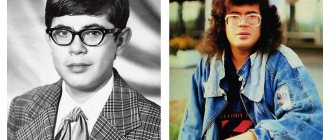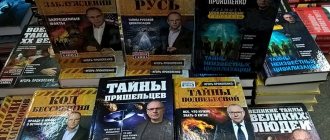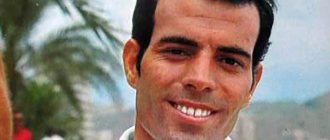Childhood and youth
Igor Petrovich Vladimirov was born on January 1, 1919 in the Ukrainian People's Republic, in the city of Yekaterinoslav. Now this is the city of Dnepr. After the birth of the boy, the family moved to Kharkov and lived there until 1932. In the same year they moved to Leningrad.
Igor Vladimirov in his youth
After the move, Igor had to study at a new educational institution. In 1936, the guy graduated from high school No. 25 and entered the shipbuilding institute. In 1941, the Great Patriotic War began, and on July 4, Vladimirov voluntarily went to fight in the 3rd Infantry Regiment of the 2nd Infantry Division of the Leningrad People's Militia Army.
The future actor served for 2 years on the Leningrad Front. Igor was awarded the medals “For the Defense of Leningrad”, “For the Victory over Germany in the Great Patriotic War of 1941-1945”, “For Valiant Labor in the Great Patriotic War of 1941-1945”.
Igor Vladimirov
In 1943, the guy was demobilized so that he could defend his diploma. Vladimirov successfully graduated from the institute and received a specialty as a shipbuilding engineer. The future actor was immediately hired at the Central Design Bureau - 51 in the city of Gorky. The guy worked there until 1944, and then became an employee of Rybsudproekt in Leningrad and worked there until 1947.
Biography
Igor Vladimirov was born on January 1, 1919 in Yekaterinoslav (now Dnepropetrovsk).
Igor Vladimirov photography
In 1943, Igor graduated from the Leningrad Shipbuilding Institute, but soon realized that his calling was theater.
He entered the acting department of the Leningrad Theater Institute, from which he graduated in 1948. Advertising:
After graduating from the institute, he was accepted into the troupe of the Leningrad Theater. Lenin Komsomol, where he played the roles of young heroes. His creative destiny was largely determined by his meeting with Georgy Tovstonogov, who headed the theater in 1949. The young actor not only was involved in the performances of Georgy Tovstonogov, but also learned the basics of the directing profession, assisting the master. In 1956, together with G. Tovstonogov, he moved to the Bolshoi Drama Theater. Passed a director's internship with G. Tovstonogov.
In 1960 he was appointed chief director at the Theater. Lensovet, who was experiencing a creative crisis after the departure of artistic director N. Akimov. Igor Petrovich Vladimirov led the Lensoveta Theater until the end of his life.
Igor Vladimirovich died on March 20, 1999.
Personal life
He was married to actresses Zinaida Sharko and Alisa Freindlich.
In his marriage to Alisa Freindlich, he had a daughter, Varvara.
Father-in-law - Bruno Freundlich, actor, People's Artist of the USSR (1974).
Creation
Theater performances
By 1960, Igor Vladimirov’s creative individuality was quite clearly formed. The director’s bright sense of humor, ability to work with the musical score of the play, and focus on working with young people determined the new face of the theater. Lensovet, which has entered a new stage of its development. Vladimirov carefully and scrupulously selected new actors for the troupe, managing to assemble a constellation of creative individuals in the theater in a short time. From the very beginning, the director placed his main bet on young actors: D. Barkov, L. Dyachkov, Georgy Zhzhenov, N. Penkov, Alexey Petrenko, Anatoly Ravikovich, V. Kharitonov. One of the most important successes was the arrival of Alisa Freindlich to the theater troupe, whose name for many years became inextricably linked with the theater and the most significant works of director Vladimirov.
Theater named after Lensovet introduced new features into the theatrical palette of Leningrad at that time from the very beginning of Igor Vladimirov’s work. The organic synthesis of a bright play form, lyrical journalism and the all-pervasive musical element formed a truly innovative theatrical style. If in the first period of Vladimirov’s work it was possible to talk about two repertoire lines - the “problematic” (“My Poor Marat” and “Tanya” by Alexei Arbuzov, “Pygmalion” by Bernard Shaw, “Romeo and Juliet” by W. Shakespeare) and the “musical-comedy” ' (“The Convent” by V. Dykhovichny and M. Slobodsky), then by 1966, with the production of “The Threepenny Opera” based on Bertolt Brecht, a special synthetic genre was formed at the Lensoviet Theater, combining the best features of eccentricity and tragedy, journalism and lyricism , musical and dramatic performances. It is in this genre in the theater. Lensovet Igor Vladimirov staged the best performances of the 1970s, which had huge audience success: “The Taming of the Shrew”, “Dulcinea of Toboso”, “People and Passions”, “Lefty”, “Troubadour and His Friends”. These performances were many years ahead of the triumphant march across Russian stages of the musical genre. Among the performances of other genres is “The Players” by Gogol, which remains in the theater’s repertoire.
In 1976, after a twenty-year break, Vladimirov again appeared on the stage of his theater as an actor. He played in such plays as “Interview in Buenos Aires” (Carlos Blanco), “Eldorado” (He), “The Cherry Orchard” (Gaev), “Whose are you, old man?” (Bagorych), “Gaslight” (Raf), “Song of the City” (Director), “Round Table Lampshaded” (Prishivin), “Heart of a Dog” (Preobrazhensky).
The entire period of work at the theater. Lensovet Igor Vladimirov paid a lot of attention to the formation of the troupe. The director invited talented actors to his theater who he had noticed on provincial stages, such as Alexey Petrenko, Efim Kamenetsky, Galina Nikulina. Among Vladimirov’s students who grew up on the stage of the theater. Lensovet into serious stage masters - Sergey Migitsko, Mikhail Boyarsky, Larisa Luppian, Oleg Levakov, Irina Mazurkevich, E. Baranov, V. Matveev, A. Puzyrev, T. Yakovleva, A. Aleksakhina, M. Devyatkin, L. Leonova, E. Markina, Semyon Strugachev, A. Semenov, E. Filatov and many others. In fact, these are several generations of actors raised by director Igor Vladimirov. For many years, Vladimirov led an acting workshop at LGITMiK (now SPGATI), and his students organically joined the troupe.
Vladimirov’s consistent reliance on youth led to an unprecedented action for Leningrad: in 1979 at the theater. Lensovet opened its branch - the Youth Theater, the basis of which was Vladimirov's students at LGITMiK. The actors of the branch were involved in performances of the main repertoire of the theater. Lensovet, and on the small stage they played their own independent repertoire. In 1980, the Youth Theater, headed by its director S. Spivak, became a separate theatrical structure, while retaining its name (today the Youth Theater on Fontanka).
At the end of the 1980s, Igor Vladimirov and his theater were unable to avoid the creative crisis that was characteristic of almost all Leningrad theaters of that time. Many actors left the troupe: Galina Nikulina, M. Boyarsky, A. Ravikovich, I. Mazurkevich, E. Kamenetsky, L. Dyachkov, Elena Solovey, Pyotr Shelokhonov. The departure of Alisa Freundlich was a huge loss for the theater.
However, many of Vladimirov’s performances remained in the repertoire of the theater. Lensovet. These are “Baby” by J. Letraz, “Love to the grave” by A. Nikolai, “KGB Hussar” by V. Ratzer and V. Konstantinov, “Players” by N. Gogol.
Best weeks
| Rich and famous Visits: 996 | A man's beard decorates him Visited: 1064 | Margaret Douglas Visits:1005 |
Theater
Even in his youth, Igor Vladimirov realized that he wanted to devote his life to the theater. In 1945 he entered the Leningrad Theater Institute. The artist studied at the acting department for 4 years and graduated in 1948.
Alisa Freindlikh and Igor Vladimirov in the play “The Cherry Orchard”
After graduation, Igor served in the Leningrad Regional Operetta Theater and the Leningrad Touring Theater until 1949. This was the initial stage of Vladimirov’s career. For the next 7 years he appeared on stage at the Leningrad Theater. Lenin Komsomol (now the Baltic House Theater). Mostly Igor Petrovich played young characters.
Vladimirov’s career took off after meeting director Georgy Aleksandrovich Tovstonogov. Igor not only took part in his performances, but also simultaneously studied the profession of director.
Igor Vladimirov at rehearsal
In 1956, Igor Petrovich, together with Tovstonogov, moved to the Bolshoi Drama Theater. Gorky. The artist worked there until 1960 as a trainee director. Vladimirov even managed to stage several performances on his own. At the same time, he worked for himself and staged productions in other Leningrad theaters.
In November 1960, Vladimirov took up the position of chief director and artistic director of the Leningrad Theater. Lensovet. The man worked in this position for 39 years, until his death. In addition to acting, from 1963 to 1998, Igor Petrovich was a teacher at the Leningrad Theater Institute. In 1980, he received a scientific degree and became a professor.
Theater life
Vladimirov graduated from the acting department of the above-mentioned educational institution with honors and began working in several theaters at once, among which was the Lenin Komsomol Theater. This temple of the servants of Melpomene played a special role in Vladimirov’s life - it was there that the future director met the legendary Georgy Tovstonogov. The master immediately saw in the young actor the makings of a talented director and began, sparing no effort, to teach him the basics of the profession.
In parallel with working in theaters and studying directing, Igor also played in films - the textured young actor was invited to filming more and more often. He became quite famous by playing the main role in the film “The Secret of Two Oceans.” After the release of this picture, Vladimirov was literally showered with offers. However, Igor had already decided everything for himself - he chose directing, becoming a faithful student of Tovstonogov. Following Georgy Aleksandrovich, Igor went to the Gorky Bolshoi Drama Theater as his trainee. Here he staged six performances before he decided to set out on his own and moved to the Lensovet Theater. This happened in 1960. From the same year, Igor Petrovich became its main director and artistic director.
Sometimes we wear a bra incorrectly: ways that are harmful to health
The star of the series “Sultan of My Heart” spoke about the choice of his future wife
When toothpaste is harmful to children: permissible age doses
Movies
The theater was not the only area of activity in Vladimirov’s life. The artist also starred in films. Of course, cinema was not in his first place, but nevertheless, there are many famous films in his filmography. The actor's debut took place in the film "The Secret of Two Oceans." Igor starred in the title role of Andrei Skvoreshni.
Igor Vladimirov in the film “The Secret of Two Oceans”
Another famous film was the film “An Old-Fashioned Comedy”, which was filmed in 1978. Igor Vladimirov played the role of chief physician Rodion Nikolaevich. The artist worked together with his second wife Alisa Freindlich, who received the second main role of the patient Lydia.
Igor Petrovich became the director of the adult fairy tale “The Extra Ticket”. He starred in the leading roles together with Elena Solovey and Mikhail Boyarsky. The film was filmed in 1983 and became very popular among citizens of the Soviet Union.
Alisa Freindlich and Igor Vladimirov in the film “Old-Fashioned Comedy”
Throughout his entire acting career, from theaters to films, Vladimirov was awarded awards and titles. So, in 1966 he became an Honored Artist of the RSFSR. In 1974, he was named People’s Artist of the RSFSR, and in 1978, Igor Petrovich was awarded the title “People’s Artist of the USSR.”
"Golden era" of the theater
At that time, the Leningrad City Council was in decline. Vladimirov not only brought him out of the crisis, but also breathed new life. He built it with the clarity and consistency of an engineer, combining it with the passion of an artist and the imagination of an artist. His original ideas, bold decisions and experiments helped the theater reach a new level. Including thanks to the updated cast. The artistic director actively looked for talented, young and promising artists, collected them from provincial scenes, and lured them away. And he devoted himself entirely to the theater - he could work for days, so many performances were released in two or three weeks. “The actor is the highest and final authority of theatrical art, it is he who comes into contact with the viewer, who takes upon himself all the good and bad,” Vladimirov said in an interview with the magazine in 1983.
He saw his role as creating a situation in which the actor has a deceptive, to a certain extent, feeling that he invented it all himself. “When an actor realizes that he can come up with something himself, he begins to respect himself. Flood with proposals... All that remains is to turn him in the right direction.” And it worked. Lively, interesting and vibrant performances delighted the audience. There were not enough tickets; spectators were ready to stand in line at the box office for hours just to get into their favorite theater.
He raised almost five generations of artists - a galaxy of brilliant Soviet and Russian stars. The names associated with his theater are A. B. Freindlikh , A. V. Petrenko , E. A. Kamenetsky , G. I. Nikulin , L. R. Luppian , O. A. Levakova , I. S. Mazurkevich , T. M Yakovleva, A. Ya. Aleksakhin, L. V. Leonov , A. A. Semenov , E. A. Filatov and many others.
His students idolized him, loved him and treated him like a father. According to People's Artist of Russia Sergei Migitsko , Vladimirov was generously gifted by God, both as an actor, and as a teacher, and as a person. “He did everything with talent: he played on stage, lived life, taught students, drove a car, courted women, drank. He taught us to fanatically, selflessly devote ourselves to our profession and life... He reacted amazingly vividly to us, if he laughed, then to tears, if he was happy, then like a child... He was a born comedian - I have never seen such a sense of humor as Vladimirov’s one director."
Article on the topic
One for all. Seven best films of Mikhail Boyarsky
Mikhail Boyarsky admitted more than once that he had one director - Vladimirov. “This was our Lord God. I studied with Makariev , but they didn’t take me to any theater. Vladimirov took me only because I sang “There is nothing better in the world...” I am Pinocchio, he “knocked me out,” said the actor. “At times he was unrestrained in his expressions, he could seriously offend, but in such a way that it was beneficial and spurred you on, giving you a chance.”
According to actress Elena Rufanova , thanks to the master, it was easy in the theater. “Igor Petrovich did everything with great love. Everyone in the theater was his “children,” all of the “same blood type.” It is important for a young man, a future artist, to know that he is loved - this gives him freedom, the right to make mistakes.”
Along with his hard work in the theater, he acted in films and tried himself as a director and screenwriter.
On the set of the film “Your Contemporary”, 1967 Elizaveta Kondratyevna and Igor Vladimirov. Photo: RIA Novosti/B. Baldin
Personal life
The personal life of Igor Vladimirov was eventful. The actor was officially married 3 times and has two children. The first wife was Zinaida Sharko, who also worked at the theater. Lensovet. In 1953 they got married, and 3 years later their son Ivan was born. In 1960, the couple had to divorce. For what reasons is still unknown.
Igor Vladimirov and Zinaida Sharko with their son Ivan
The actor's second wife was the famous actress Alisa Freindlich. She is known for the films "Office Romance", "D'Artagnan and the Three Musketeers" and "Acting Duty". Vladimirov met her on the set.
Igor Vladimirov and Alisa Freindlich
There are rumors that he cheated on Zinaida with Alisa, because they got married immediately after his divorce from his first wife, in 1960. In 1968, their daughter Varvara was born, who in the future also became an artist. In 1981, the couple decided to divorce.
Igor Vladimirov and Inessa Perelygina
The actor’s third wife was Inessa Perelygina. The girl was 44 years younger than Vladimirov, but nevertheless they fell in love with each other and got married. There were no children from this marriage.
Lensovet Theater
In those years, the Lensovet Theater was experiencing a crisis. Igor Vladimirov became the person who gave him a second life. He completely renewed the composition of the troupe (by the way, since 1962, Alisa Freindlich also played in the theater troupe), lured actors from other institutions, looked for new “stars” day and night, and worked day and night.
The theater was Vladimirov’s one great love, his life - he gave all of himself to the theater, and his students, his subordinates paid him in the same coin - sincere respect and love. Igor Petrovich stood at the head of the Lensovet Theater until the end of his days.
Death
The last years of his life became difficult for Igor Petrovich. He was seriously ill and constantly traveled to hospitals. The artist underwent several operations, but the disease became the cause of death.
Grave of Igor Vladimirov
On March 20, 1999, Vladimirov died at the age of 80 in St. Petersburg. His grave is located at the Bolsheokhtinsky cemetery, next to his parents. The photograph shows that his portrait is engraved on the artist’s monument, and under it is the inscription “People’s Artist of the USSR.”
Love and the stage
Vladimirov’s personal life was as seething as his theatrical life. He was a passionate man and knew how to find the keys to a woman's heart. In the Leningrad City Council he met his first common-law wife, Zinaida Sharko . They say that having fallen in love, Vladimirov exclaimed with admiration: “You don’t understand, there’s a devil in her!” They did not legalize the relationship, but gave birth to a son, Ivan . However, the director was too temperamental. He was jealous of his young wife, but because he himself was unfaithful. We parted noisily, with scandals. As his son recalled many years later, one day Zina found her father’s notebook with a Don Juan list: “She remained silent, but when her father once again made a wild scandal because of her past hobbies, she said: “Your girls can create a third-rate brothel, and of my men - the best theater in Europe!
On the stage he met his second wife, Alisa Freundlich. The young artist played in “Chance Encounters” at the Theater. V. F. Komissarzhevskaya. He was captivated by her and lured her to his theater.
“Igor Vladimirov took me all in,” recalled Alisa Brunovna. — He was 16 years older, wiser, easy to communicate, and his sense of humor simply stunned me.
She became his prima and muse. From their love brilliant performances and daughter Varvara . And although at rehearsal they understood each other without words, in their personal lives there was no such coherence. The talented, intelligent, charismatic artistic director attracted many women. In addition, it was difficult for him to put up with his wife’s success. She received more attention in the press, they wrote rave reviews, but not a word about him. And he could not curb his romantic nature. At some point, both realized that they could no longer be together as spouses.
Vasily Gubanov. Filming of the film “Your Contemporary”. Photo: RIA Novosti/B. Baldin
His last love was actress Inessa Perelygina . They met at an audition and looked closely at each other for a long time. The age difference was 44 years, but they got married and did not part until the very end. In the last years of his life, Igor Vladimirov was seriously ill, was in hospitals, and underwent several operations. He passed away at age 80, in March 1999. As he wanted, he was buried at the Bolsheokhtinsky cemetery next to his mother, and not at the prestigious Volkovsky, known as “Literary Bridges”.
Vladimirov - appeared on stage in dozens of performances and staged about 80 of his own, shot about 10 films and played in 33 films. He became the “godfather” of many outstanding actors and forever inscribed his name in the annals of the national theater.
Personal life of Vladimir Bortko
The director prefers not to talk about his private life, believing that this is a purely personal topic that should not be put on public display.
Bortko’s wife and the mother of his only son Vladimir’s name is Natalia (born 1950), she is a screenwriter by profession, she worked with her husband on his films “Heart of a Dog”, “The Circus Burnt Down and the Clowns Ran Away”, “Good Luck to You, Gentlemen”.
Vladimir Bortko with his wife Natalia
Vladimir Bortko Jr. successfully graduated from St. Petersburg University and is fluent in Chinese. He is a Tangut specialist, i.e. scientist who studies the languages of the ancient Chinese Tangut people. There are just over a dozen such specialists in the world. Vladimir Bortko Jr. has already made his father a happy grandfather. “Life Line”: Vladimir Bortko
Vladimir Bortko: “Putin is not my friend, he is the master”
“I believed that if I made “Heart of a Dog,” my country would be better off.”
— Vladimir Vladimirovich, what happened to you? You, the famous director who directed the landmark film “Heart of a Dog,” perhaps one of the best in the history of Russian cinema, who directed “The Idiot,” “The Master and Margarita,” suddenly became such an avid Stalinist.
“I became an avid statist, as I always have been. I don't change anything, my dear, these have always been my beliefs. I'll try to explain. Quite a long time ago I began to think: why is Russia the way it is? Why is this not France, not Germany?.. Not at all because the mysterious Russian soul and the writer Dostoevsky exist. But because the territory of the Russian Federation includes the national territories of other states: Tatarstan, Yakutia, Dagestan, etc., which is not the case in either France or Germany. Even the large number of Turks in Germany and Arabs in France does not change anything in this sense. Russia can only exist with strict centralization. In addition, the country must be held together by an idea that cements all its numerous lands and peoples into a single whole. Stalin understood this well. But when liberals talk about Stalin, they only talk about repression. And they don’t like to remember that under his leadership the country began to occupy the second position in terms of economy in the world. I'm not a fan of repression at all. But there is an idea that is dear to me. This is the idea of socialism. This idea holds the country together much better than a monarchy, and much better than what we have now, when nothing holds us together. And it’s certainly better than when 10% of citizens own 90% of the national wealth. And this is now. That's how I became an avid Stalinist.
— Is this the only such unique country?
— There is also China, which is structured in much the same way. And who's in charge? Communist Party. Take it away and China will fall apart.
- But you yourself, with your “Heart of a Dog”, drove almost the last nail into the coffin of the Soviet Union. And now do you repent?
- I don’t regret it at all. I did not drive nails into the coffin of the Soviet Union. I wanted to fix it. As, in fact, is the author of the story. Otherwise, as you understand, Bulgakov would hardly have lived to see a natural death. Nowhere in his books did Bulgakov say anything against the Soviet regime. Remember, in “Heart of a Dog”, Professor Preobrazhensky: “...Is it said somewhere in Karl Marx that the 2nd entrance of the Kalabukhov house on Prechistenka should be boarded up and walked around through the back door? Who needs it? Why can’t the proletarian leave his galoshes downstairs, but dirty the marble?..” This fatal question interested me then. Moreover, he still interests me to this day. But from the version of “The Master and Margarita” - Woland about Stalin: “... He has a courageous face, he does his job correctly, and in general it’s all over here. It is time!" Another thing is that Bulgakov was never a supporter of Soviet power. He was more of an observer. I watched her from the side. From the basement. Like a Master. And if you are adapting a book, you must share the views of the writer, otherwise nothing good will come of it.
"Master and Margarita".
— I would compare you, perhaps not very appropriately, with Andrei Dmitrievich Sakharov, who created the hydrogen bomb, and then was horrified by the work of his own hands and became the most important dissident. You, too, were horrified by what you did in your film, and became... only not a dissident, but a devout Stalinist.
- I wasn’t horrified. I was upset that the film was being used to attack socialism. But I believed that if I made “Heart of a Dog,” my country would be better off.
- What kind of country is this if, under Gorbachev, whom you disliked, as soon as they opened the window called glasnost, such wonderful films as yours, like “Repentance”, began to come out, and everything collapsed, fell apart?
“I’m just afraid that the list of these wonderful films will be difficult to continue.” Whereas during the so unloved Soviet regime there were much more of them. As for the fact that everything was false, everything collapsed... Hitler also thought that everything would collapse, but something else happened...
— You know, the Great Patriotic War is not discussed. Of course, this is an unprecedented feat of the people and the Communist Party, which led the country.
- I love my country, whatever it is. Maybe this is not the best country in the world, and some unsightly people were caught, there are better peoples. Here are the Germans, for example: they drink once a week, switch only to green, and go to work at seven in the morning... But I am the son of my people. I am them... Do you know what the difference is between liberals and statists? The liberal idea is not bad, on the contrary, it is very beautiful: there is an individual person, and we must make sure that the person feels good. Great idea! But I want it not for people in general, but for my people to feel better. Not to an individual, but to the majority of the people.
- This is wonderful, but for some reason all such ideas end up being the basis for the extermination of millions of people. And you are against repression.
“I’m afraid that you and I will disagree greatly in numbers here.” That’s not the point; any repression is bad. But again, where are you looking for them all, repressions? Was the Tsar persuaded to abdicate by the Communists? No, liberals. Were the communists preparing the empire for collapse? Again, liberals. Exactly the same as today. Read the empire's newspapers of that time - and listen to today's Echo... But this country exists only the way it exists, it cannot be done any other way. And if this does not suit the best, in your opinion, part of the population - what to do? The rest cannot live any other way.
— But in one television talk show you said that you were ready to sacrifice your family so that your native country could live. How shoud I understand this?
- “...Well, son, did your Poles help you? So sell... Sell faith, sell friends, sell land. Well, get off your horse! Stop and don’t move!.. I gave birth to you, I will kill you...” That’s roughly how to understand it. And it doesn’t matter whether I will live after this.
- Just like in the Civil War: son against father, brother against brother...
- I reason as a person who understands where he lives, in what country, the son of what people he is. And I practically have no other choice. Now we have joined the WTO. The question is, why? After all, everything done here will cost more than there.
- Listen, don’t immerse me in your Duma showdowns...
“This is not a Duma showdown, this is our life with you.” Who did it? Those who trade oil and metals. This is very beneficial for them. What about you and me?
— I don’t want to talk about the WTO anymore. About your family... If you are so ready to sacrifice it, then do you consider yourself a piece of wood?
- Not a sliver, but a part - that’s a big difference.
— Remember the expression of your mustachioed idol: “When the forest is cut down, the chips fly”?
- He never said that. I know all his statements well. I'm trying to think and figure out what's going on here, why I'm here, what's surrounding me. And find a way out of this situation. A way out for the whole people, for the country.
“Nikita Sergeevich serves the Tsar, and I serve the idea”
— And that’s why you joined the Communist Party of the Russian Federation?
— Yes, today this party is closest to my ideal. I don't see another one yet.
- Yes, you have a tame party that will always lend its shoulder to United Russia at the right moment. You’d better go to Navalny, that would be interesting.
— No, I cannot join Navalny: not all of his ideas suit me. In general, he is harming my country.
- And what should be done with him in this case?
- Nothing. Do not mention it.
- Just according to your logic: he harms my country - he is an enemy of my country...
- Here's a sea battle. And our ship, having received holes, fights with enemy ships. The captain skillfully maneuvers, the crew defends itself from boarding. And at this time a cry is heard from the hold: “Listen, captain, there’s not enough corned beef!.. And your first mate is a thief! Yes, and the gunner...” Are they shouting from the hold correctly? Maybe right, but not quite on time, to put it mildly.
"Idiot".
What do we have? Does Echo work? Does Rain work? RBC? “Novaya Gazeta”?.. Democracy rampant! And if 90% vote for Navalny, no amount of fraud will help. But the trouble is that you yourself cannot unite. In general... There are two things - the Constitution and the Criminal Code. The Constitution is what is possible, and the Criminal Code is what is not. We must comply with them and that’s it.
— Excellent words, they need to be cast in granite, as our previous president Dmitry Anatolyevich Medvedev said. Also a liberal, by the way.
— He recently spoke in our Duma. With a report. I think this was the best and most fantastic story that could be done in 40 minutes. Well, something like “the next generation of Soviet people will live under communism.” Therefore, I am very skeptical about the activities of Mr. Medvedev and his government.
— And I look skeptically at our TV, in which you periodically appear in various political talk shows. On this TV there are “you can” and there are “you can’t”. So, you can scold Medvedev, all the deputies, even United Russia, the economic bloc of the government, but you can’t scold Comrade Putin.
- Why comrade? He is the master.
- Well, yes, he is not your friend. But you can't scold him.
- Why, it’s easy. For domestic policy. External - we approve.
- Well, then tell me about the Panamanian offshore companies, about his cellist friend. Would you like to make a statement for the press?
- No I do not want to. There is a Flag, an Anthem, and a President. Whether you like the color of this flag or not; whether you like Alexandrov’s music or not, it is nevertheless an Anthem.
- Agree.
- And this is the President. Which holds the country together. For the country is held together by three things: the President, law enforcement agencies (now the National Guard) and television. By removing any of them, we get a collapsing country, and very quickly.
“The country should be held together not by television, which I write about every week, but by political and civil institutions.” Otherwise you talk like your colleague Nikita Sergeevich Mikhalkov, a servant of the Tsar.
“He and I think differently.” Nikita Sergeevich serves the Tsar, and I serve the idea. And you say: “Bortko is a seasoned Stalinist, he’s gone crazy, he has senile insanity...”
“I didn’t say that, Vladimir Vladimirovich, don’t.”
— And according to Echo of Moscow, Mr. Nevzorov, whom I know well, said that I stole “Heart of a Dog” from the Italian director Alberto Lattuada. Forgetting that I received the main international prize for this film in Italy. They probably saw both films there. But elections are coming soon... And that’s not what we’ll hear.
- That’s it, I won’t torture you politically anymore...
- Torture me, I get great pleasure.
“Evstigneev played like a Stradivarius violin”
- Let's talk about the artists. Apparently you love them.
- Yes, of course, very much. These are the main tools for me.
- But in the form of an instrument you had, for example, such a great artist as Evstigneev.
— Is the violin an instrument or not? Well, an artist is also an instrument. He only plays on himself. At the same time, however, one is a Stradivarius, and the other is produced by the fifth furniture factory...
"Dog's heart".
- Well, how did you like playing this violin called Evstigneev?
- Amazing. We became friends. My task is to explain to a person what he should do. If he agrees with me, then something will work out. If you don’t agree, he simply doesn’t take off. Evstigneev played like a Stradivarius violin.
- But Evstigneev plays such a liberal there... who you now hate.
- I only did what Bulgakov wrote.
- Yes, you were honest with Bulgakov, of course. Just like before Dostoevsky in “The Idiot”, and before the same Bulgakov in “The Master and Margarita”.
- This is my profession. I'm trying to translate what the writer said in literary language into cinematic language. Although this is absolutely impossible. But I have to be honest with the writer.
— And the violin called Andrei Mironov in “The Blonde Around the Corner”?
— It was very difficult, especially at the beginning. After all, Mironov is the idol of millions. Andrei Alexandrovich once asked: “Are you going to teach me how to play?” - “Well, what should I do? - I answer. “I get money for this.” So the relationship was strained at first. Then, towards the end, everything somehow came together. I remember our conversation with Mironov and the author of the script for “Blonde” Sasha Chervinsky in “Astoria”. We sat and decided what we should do, whether to make the censorship amendments that were required of us. If you don’t bring it in, the film will immediately be put on the shelf, and that’s it. But I really wanted the film to come out, so they made concessions. This was our common decision among all three of us.
—Have you met Michele Placido for a long time?
“That’s how the last day of filming “Afghan Breakdown” ended, I said: “Stop, it’s filmed!” ... - that’s it, I didn’t see him again.
— Is there any difference in his school, his style of playing compared to our artists?
- No, everything is the same everywhere. I worked with McDowell, Jacqueline Bonner - everything is the same everywhere. And if you are a professional, which I secretly hope, there won’t be any big difficulties.
— Are you filming something now or is parliament only on your mind? Here is your colleague Stanislav Govorukhin, who is filming everything and making new films in his free time from the Duma.
— I recently shot a film called “Soul of a Spy,” which became, to put it mildly, unique in my biography. If only because the producers removed their names from the credits.
- Why?
“They didn’t like it that much.” That's why no one has seen this film. He is only shown on the plane flying to America. But I have the right to film, because according to the rules of our Duma, which you so hate, it is written that deputies can do two things - teaching and creative activities.
- Hateful - you are in vain. More like funny.
- Oh, I think that the new Duma, the 7th convocation, will not seem funny to you. I think everyone will take her very seriously. We are waiting for changes!











